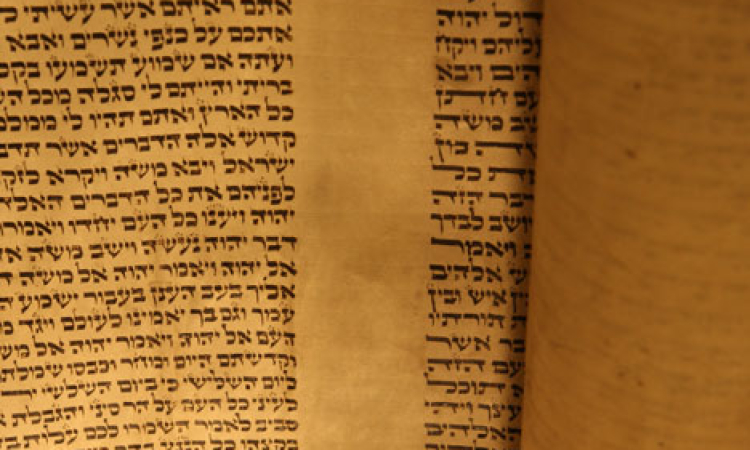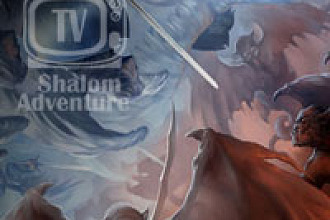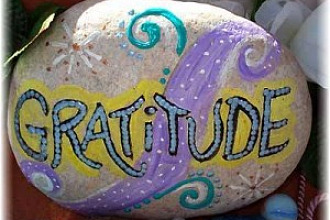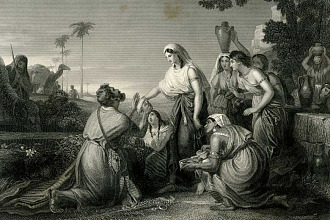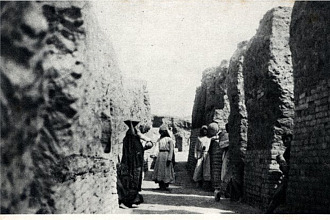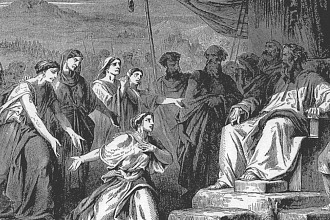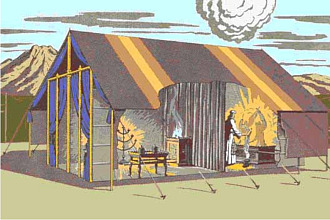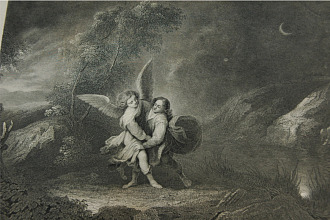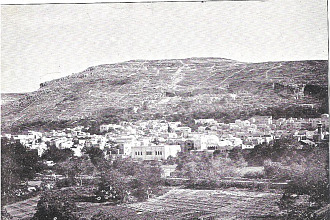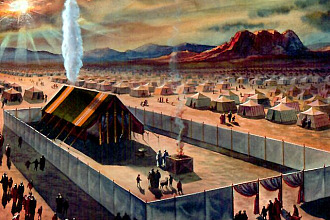Parasha for the Week: Balak Numbers 22: 2 - 25:9
Aftarah for the Week: Micah 5:6 - 6:8
Besorat Yeshua: Mark 5:35 - 6:1
Overview
Balak, king of Moav, is in morbid fear of Bnei Yisrael. He summons a renowned sorcerer named Bilaam to curse them.
First, G-d speaks to Bilaam and forbids him to go. But, because Bilaam is so insistent, God appears to him a second time and permits him to go. While en route, an angel (malach in Hebrew) blocks Bilaam’s donkey’s path. Unable to contain his frustration, Bilaam strikes the donkey each time it stops or tries to detour. Miraculously, the donkey speaks, asking Bilaam why he is hitting her. The angel instructs Bilaam regarding what he is permitted to say and what he is forbidden to say regardingIsrael. When Bilaam arrives, King Balak makes elaborate preparations, hoping that Bilaam will succeed in the curse.
Three times Bilaam attempts to curse and three times blessings issue instead. Balak, seeing that Bilaam has failed, sends him home in disgrace. Bnei Yisrael begin sinning with the Moabite women and worshipping the Moabite idols, and they are punished with a plague. One of the leaders ofIsraelbrazenly brings a Midianite princess into his tent, in full view of Moshe and the people. Pinchas, a grandson of Aharon, grabs a spear and kills both evildoers. This halts the plague, but not before 24,000 have died.
True Honor.
The Torah states: “And Bilaam said to the donkey, ‘Because you have mocked me, if I were to have a sword in my hand right now, I would kill you.’ “ (Numbers 22:29)
Rabbi Yosef Dov Soloveitchik commented that usually a person hits a donkey because he wants it to go faster so that he can get to where he is going sooner. However, Bilaam was a pursuer of honor. Therefore, when the donkey caused him irritation he considered it a slight to his honor and wanted to kill it.
Rabbi Zelig Pliskin When a person seeks honor, he doesn’t realize how ridiculous he is and how he hurts himself. Bilaam said that he wanted to kill the donkey immediately. He should have said that he would wait until he reached his destination and only then would he kill it. His seeking honor prevented him from thinking straight.
Moreover, the donkey started speaking. This was a miraculous event and Bilaam should have been overwhelmed with amazement. However, what does Bilaam focus on? Only one thing - his honor! And not only that, where is he looking for honor? From a donkey! Every honor-seeker has aspects of this same craziness in his personality. Therefore, because of the negativity of this trait one must do all that he can to overcome the desire for honor.
The Chofetz Chaim used to say that true honor is when one seeks wisdom. Gaining more wisdom is honorable in itself and when one seeks it one will free oneself from seeking superficial signs of honor that are only illusions.
From a Jewish point of view, the more prominent you are, the more you have to humble yourself — and not just while the cameras are rolling.
“Unconditional love”
In Bilaam’s blessing ofIsraelit is written, “He [G-d] has not beheld sin in Jacob, nor has He seen perverseness inIsrael. The L-rd his G-d is with him.” Rashi explains this to mean that even when the people ofIsraelsin, God is not very strict with them and does not abandon them. He is always with them. Many of our great sages and righteous leaders of our people have always tried to find the good in another person. They were able to look beyond the person’s external acts and see how he can change.
Rather than judging them for their shortcomings as acts of sin, they were able to find the good and positive hidden within that act or the conditions in which they were performed. Rabbi Levi Yitzchak of Barditchev, one of those sages whose unconditional love for his brethren was legendary, didn’t see any negative. He always found and saw the good in everyone.
The story is told of Rabbi Levi Yitzchak who while walking in the marketplace saw a Jewish coachman, enwrapped in talit and tefillin, in the middle of his prayers, greasing the wheels of his carriage in preparation for a trip.
Someone else would have scolded the man for his lack of respect for his prayers. Not so Rabbi Levi Yitzchak. He lifted his eyes upward and exclaimed, “G-d, see what a great people you have. Look how devoted this poor coachman is to You. Even when he’s greasing the wheels of his carriage in preparation for a trip he cannot refrain from praying to you!”
There are those who find fault with others even when the other person is performing a good deed and then there are those who always see only good in others. As a small child, the Lubavitcher Rebbe, Rabbi Yosef Yitzchak Schneerson, asked his father, “Why did G-d create us with two eyes? After all, we can see even with only one eye?” His father replied, “A person needs two eyes so that with the left eye, he should look at himself in order to find his own faults and correct them. At another person, however, one should always look with the right eye - with compassion and kindness.”
G-d said toIsrael, “Though the mountains be shaken and the hills be removed, yet my unfailing love for you will not be shaken nor my covenant of peace be removed,” says the LORD, who has compassion on you.” (Isaiah 54:10).
AFTARAH Micah 5:6 - 6:8
Parasha: After the Exodus G-d blessedIsraelwith many miracles.
Aftarah: The text of Micah reminds us the Exodus, “I brought you up out ofEgyptand redeemed you from the land of slavery. I sent Moses to lead you.” (Micah. 6:4)
Parasha: The central characters are Balak & Bilaam who tried to curse the people ofIsrael.
Aftarah: The story of Balak and Bilaam has to serve as a lesson forIsrael, “My people, remember what Balak king ofMoabcounseled and what Balaam answered. Remember [your journey] from Shittim to Gilgal, that you may know the righteous acts of the LORD.” (Micah. 6:5)
Parasha: G-d love unconditionallyIsrael. Even thoughIsraelhas not been faithful in the desert, “…he has blessed, and I cannot change it. No misfortune is seen in Jacob, no misery observed inIsrael. The LORD their God is with them; the shout of the King is among them. (Numbers 23:20,21). Bilaam cannot curseIsraelbecause it is the treasured possession of the L-rd. “How beautiful are your tents, O Jacob, your dwelling places, O Israel! “Like valleys they spread out, like gardens beside a river, like aloes planted by the LORD, like cedars beside the waters. (Numbers 24:5,6).
Aftarah: We are invited to demonstrate the same kindness to others, “He has showed you, O man, what is good. And what does the LORD require of you? To act justly and to love mercy and to walk humbly with your God.” (Micah 6:8).
Besorat Yeshua Mark 5:35 - 6:1
The Parasha reveals us the Unconditional love of G-d, the brith Hachadasha tells us that Yeshua personified this unconditional love. “G-d anointed Yeshua of Nazareth with the Ruach Elohim and power, and how he went around doing good and healing all who were under the power of the devil, because G-d was with him.” (Acts 10:38)
Parasha: G-d’s love is seen is verses like: “No misfortune is seen in Jacob, no misery observed inIsrael.” (23:20).
Besora: Yeshua is always ready to heal and to help people. Since the last portions of the Besora, Yeshua is going to the house of Jairus, the chef of the synagogue to heal his daughter. But he has been stopped on his way and now emissaries came from the house of Jairus to tell him that his daughter died. Jairus was depressed, but Yeshua has a word of love for him “Don’t be afraid; just believe.” Relationship with G-d has to be based on faith, not on fact. In the Besora Yeshua is the one who get victory upon death, Jairus’ daughter is resurrected.
Parasha: Bilaam prophesied about the Mashiach when he said: “I see him, but not now; I behold him, but not near. A star will come out of Jacob; a scepter will rise out ofIsrael.” (Num. 24:17)
Besora: The star of David has always been a messianic symbol. The wise men from the East followed an unusual star based on Bilaam’s prophecy. They believed the star was taking them to the King. It led them to Bethlehem to the new born King – Y’shua.

